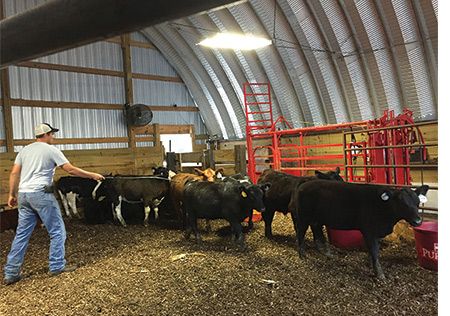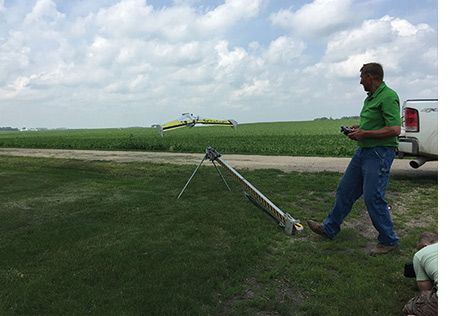Des Moines "city girl" experiences farm, dispels myths
Author
Published
8/11/2015
Most of my life I didn’t know the first thing about agriculture. I’ve lived on the east side of Des Moines since I was seven years old. I am not afraid to admit it; I’m a “city girl!” It’s no wonder my internship with the marketing and communications department at the Iowa Farm Bureau Federation has taught me more than what was written in any job description.
Understand, this ‘city girl’ was required to watch King Corn for two different college courses at the University of Iowa, and to read multiple books that disparage the treatment of livestock. So, when I started at Farm Bureau in early June I came with a million questions. There were so many scary claims I had heard at school and on the Internet about agriculture and even the Farm Bureau; the state’s largest farm organization.
Books and articles I’d read said that Farm Bureau doesn’t actually represent the interests of real farmers, corn is making animals sick, and animals are loaded up with antibiotics because they can’t function without them. And being from Des Moines I couldn’t escape the claim that farmers are unashamedly polluting our water supply. I’m proud to say my research and my first-hand experiences this summer disproved those claims, and taught me why simply doing a ‘Google’ search won’t give you the whole truth.
On my first day, one of my co-workers, Andrew Wheeler, explained the grassroots structure of Farm Bureau to me. The policies IFBF champions come directly from the Farm Bureau members in all of Iowa’s 99 counties. IFBF President Craig Hill and the Board of Directors are all farmers. Suddenly every angry article I’d read online about Farm Bureau ignoring the opinions of farmers seemed foolish.
When it comes to livestock farming, I also had my eyes opened by visiting farms, and talking to farmers. I didn’t know it is illegal to send an animal to market if there is any trace of antibiotics left in its system. And after use, animals go through a withdrawal period before going to market to ensure all residue has left the animal. Furthermore, farmers only use antibiotics to treat or prevent illness.
 (Caption: Chasen Stevenson, president of the Iowa Farm Bureau Young Farmer Advisory Committee, directs his livestock in on his farm in Marion County. I visited his farm with a Spokesman reporter who was working on a story about him. He was nice enough to talk to me as well about some of my questions about livestock care.)
(Caption: Chasen Stevenson, president of the Iowa Farm Bureau Young Farmer Advisory Committee, directs his livestock in on his farm in Marion County. I visited his farm with a Spokesman reporter who was working on a story about him. He was nice enough to talk to me as well about some of my questions about livestock care.)
I didn’t know that much like myself, cows are most likely to get sick from changes in the weather — not from eating corn. I met a livestock farmer a few weeks ago who told me he’s never had any problems with his animals as a result of eating corn but when the weather changes overnight, he’ll have more respiratory problems then he knows what to do with.
While some people champion the “grass-fed beef” movement, the reality is corn is a type of grass . And many producers work with nutritionists and other experts to ensure corn is integrated safely into the cows’ diets.
Conservation was another area with a steep learning curve for me. It’s been easy for me in the past few years to find information about how agriculture negatively impacts the environment. Even my doctor was telling me just the other day about how ‘horrible’ modern agriculture is for the environment.
 (Caption: Jeff Frank, a farmer from Sac County, launches one of his drones on a crop scouting mission. I got to meet him while working with my boss, Laurie Johns, on an Iowa Minute shoot.)
(Caption: Jeff Frank, a farmer from Sac County, launches one of his drones on a crop scouting mission. I got to meet him while working with my boss, Laurie Johns, on an Iowa Minute shoot.)
But much like me at the beginning of the summer, she didn’t know about all the work farmers are doing to protect water and land quality. I’ve visited farms practicing no-till and strip-till planting. I’ve seen a saturated buffer and two restored wetlands. I got to see firsthand how farmers are using drones to scout their crops and apply chemicals only where needed. I’ve even learned the GMO crops that many question (despite numerous studies testifying to their safety) also improve conservation. GMO crops can resist diseases and pests, so they need less chemical treatment to thrive.
While traveling across the state all summer, I learned from farmers how to identify different practices, like terraces and grassy waterways. I see these practices so often I even turned my new-found ag knowledge into a travel game on road trips, pointing out and quizzing family and friends about conservation practices (thereby cementing my proud “geek” status)!
My experiences this summer have shown me there is much to learn about modern agriculture. It’s too easy for myths to spread among people like me. We hit ‘Google’ or read one-sided class assignments, and never question whether it’s true.
But the men and women I’ve met out in Iowa’s fields this summer are open to the conversation about their practices — what farmers are doing well and where there is room for improvement. No one I’ve worked with at Farm Bureau has ever told me all farmers do everything right. But what I’ve learned is the majority are doing what they can to preserve Iowa’s environment, properly care for their animals, and make a sustainable living. And to me, that is worth sharing.
By Cassidy Riley. Cassidy is a marketing and communications intern with the Iowa Farm Bureau.
Understand, this ‘city girl’ was required to watch King Corn for two different college courses at the University of Iowa, and to read multiple books that disparage the treatment of livestock. So, when I started at Farm Bureau in early June I came with a million questions. There were so many scary claims I had heard at school and on the Internet about agriculture and even the Farm Bureau; the state’s largest farm organization.
Books and articles I’d read said that Farm Bureau doesn’t actually represent the interests of real farmers, corn is making animals sick, and animals are loaded up with antibiotics because they can’t function without them. And being from Des Moines I couldn’t escape the claim that farmers are unashamedly polluting our water supply. I’m proud to say my research and my first-hand experiences this summer disproved those claims, and taught me why simply doing a ‘Google’ search won’t give you the whole truth.
On my first day, one of my co-workers, Andrew Wheeler, explained the grassroots structure of Farm Bureau to me. The policies IFBF champions come directly from the Farm Bureau members in all of Iowa’s 99 counties. IFBF President Craig Hill and the Board of Directors are all farmers. Suddenly every angry article I’d read online about Farm Bureau ignoring the opinions of farmers seemed foolish.
When it comes to livestock farming, I also had my eyes opened by visiting farms, and talking to farmers. I didn’t know it is illegal to send an animal to market if there is any trace of antibiotics left in its system. And after use, animals go through a withdrawal period before going to market to ensure all residue has left the animal. Furthermore, farmers only use antibiotics to treat or prevent illness.
 (Caption: Chasen Stevenson, president of the Iowa Farm Bureau Young Farmer Advisory Committee, directs his livestock in on his farm in Marion County. I visited his farm with a Spokesman reporter who was working on a story about him. He was nice enough to talk to me as well about some of my questions about livestock care.)
(Caption: Chasen Stevenson, president of the Iowa Farm Bureau Young Farmer Advisory Committee, directs his livestock in on his farm in Marion County. I visited his farm with a Spokesman reporter who was working on a story about him. He was nice enough to talk to me as well about some of my questions about livestock care.)I didn’t know that much like myself, cows are most likely to get sick from changes in the weather — not from eating corn. I met a livestock farmer a few weeks ago who told me he’s never had any problems with his animals as a result of eating corn but when the weather changes overnight, he’ll have more respiratory problems then he knows what to do with.
While some people champion the “grass-fed beef” movement, the reality is corn is a type of grass . And many producers work with nutritionists and other experts to ensure corn is integrated safely into the cows’ diets.
Conservation was another area with a steep learning curve for me. It’s been easy for me in the past few years to find information about how agriculture negatively impacts the environment. Even my doctor was telling me just the other day about how ‘horrible’ modern agriculture is for the environment.
 (Caption: Jeff Frank, a farmer from Sac County, launches one of his drones on a crop scouting mission. I got to meet him while working with my boss, Laurie Johns, on an Iowa Minute shoot.)
(Caption: Jeff Frank, a farmer from Sac County, launches one of his drones on a crop scouting mission. I got to meet him while working with my boss, Laurie Johns, on an Iowa Minute shoot.)But much like me at the beginning of the summer, she didn’t know about all the work farmers are doing to protect water and land quality. I’ve visited farms practicing no-till and strip-till planting. I’ve seen a saturated buffer and two restored wetlands. I got to see firsthand how farmers are using drones to scout their crops and apply chemicals only where needed. I’ve even learned the GMO crops that many question (despite numerous studies testifying to their safety) also improve conservation. GMO crops can resist diseases and pests, so they need less chemical treatment to thrive.
While traveling across the state all summer, I learned from farmers how to identify different practices, like terraces and grassy waterways. I see these practices so often I even turned my new-found ag knowledge into a travel game on road trips, pointing out and quizzing family and friends about conservation practices (thereby cementing my proud “geek” status)!
My experiences this summer have shown me there is much to learn about modern agriculture. It’s too easy for myths to spread among people like me. We hit ‘Google’ or read one-sided class assignments, and never question whether it’s true.
But the men and women I’ve met out in Iowa’s fields this summer are open to the conversation about their practices — what farmers are doing well and where there is room for improvement. No one I’ve worked with at Farm Bureau has ever told me all farmers do everything right. But what I’ve learned is the majority are doing what they can to preserve Iowa’s environment, properly care for their animals, and make a sustainable living. And to me, that is worth sharing.
By Cassidy Riley. Cassidy is a marketing and communications intern with the Iowa Farm Bureau.